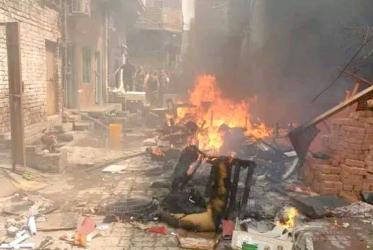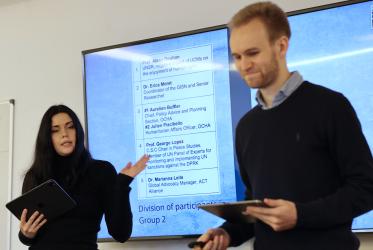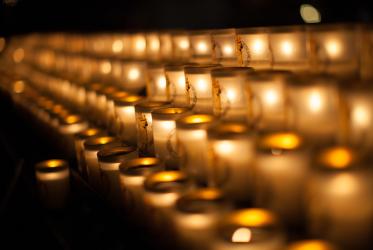WCC Central Committee, Geneva, 30 August-6 September, 2006
T
he conflict in Sri Lanka has over the past twenty-five years claimed thousands
of lives on both sides of the ethnic divide. Thousands of refugees have sought asylum
abroad while many thousands are internally displaced. The civilian population
has been put through tremendous hardships due to summary executions, torture,
illegal detentions, embargo on essential items, forced recruitment of children,
etc.
A cease-fire agreement was signed in February 2002, through the mediation of
the Norwegian Government. The Sri Lanka Monitoring Mission comprising representatives
from the Nordic countries was appointed to monitor the cease-fire
agreement.
Since April 2006, there has been a gradual collapse of the cease-fire agreement.
Intense fighting has broken out and has resulted in the displacement of 200,000
members of Tamil, Muslim and Sinhala communities. The civilian population in
the Jaffna Peninsula in the North are unable to move to safer areas due to prolonged
curfews. There is a severe shortage of food and other essential items and
thousands of civilians are helplessly caught in intense military action. Around
one thousand people have been killed and many others injured. It is innocent
civilians belonging to all communities who have suffered the most. In addition,
humanitarian aid workers have been killed, severely limiting the capacity of church
and other humanitarian agencies to respond to the crisis and to continue vital
reconstruction following the tsunami of December 2004.
The churches in Sri Lanka have provided cautious and critical support to the peace
process, amongst others through inter-religious cooperative endeavours to mobilize
people for peace and national reconciliation. The heads of churches in a pastoral
letter issued on 18th August, 2006, called on the churches "to maintain
close contact with other Christian groups and persons of other faiths in order to
build social trust and friendship" at a time when there is pain and agony in the
hearts of the people.
The Central Committee of the World Council of Churches, meeting in Geneva
30 August-6 September, 2006, therefore:
Expresses its deep concern at the widening rift between the Sinhala, Tamil and
Muslim communities and the lethal escalation of armed violence between the
security forces of the Government of Sri Lanka and the Liberation Tigers of
Tamil Ealam and the activities of the para-military groups;
Is appalled by the breakdown of the peace process and the cease-fire agreement
achieved through years of hard negotiations, mediation and involvement
of many governments, including the Norwegian Government;
Deplores military actions and suicide bomb attacks whose victims are often
innocent civilians including women and children;
Condemns the intensification and escalation of military violence by the parties
to the conflict that is causing untold misery and suffering to the people in
many parts of the island, especially those in the Northern and Eastern provinces;
Calls on the Government of Sri Lanka and the Liberation Tigers of Tamil Eelam
to respect the terms and conditions of the cease-fire agreement and put an
immediate end to all hostilities and resume peace negotiations without future
delay;
Calls also on the International Community to influence the parties of the conflict
to engage immediately in peace negotiations and put an end to the present
spate of violence;
Urges the ecumenical community to remain in constant prayer for the people
and churches of Sri Lanka and to accompany the sister churches in Sri Lanka
together with people of other faiths to strengthen their efforts towards the
restoration of peace and community integration in their war-torn country.



